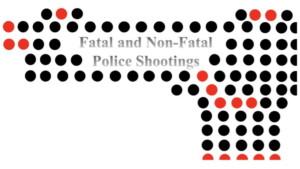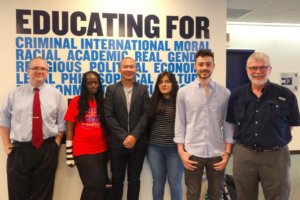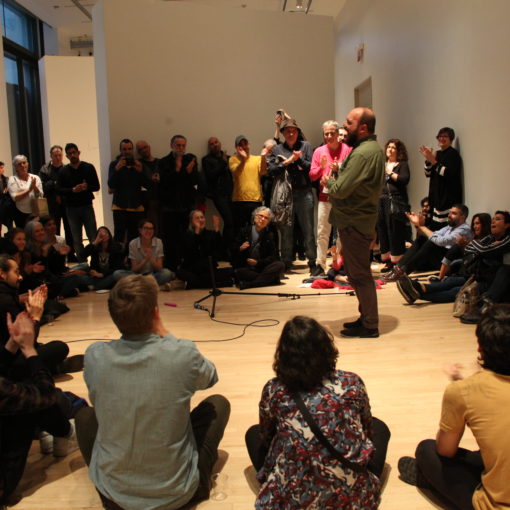Ask any doctoral student about their “dissertating” and you’re bound to hear a tale of woe about the solitary grind of producing a long piece of original research. It doesn’t have to be like that. What follows summarizes some of my experiences with a collaborative dissertating process.
 In September 2018, I started to build a faculty-student collaborative team for my dissertation research on fatal and non-fatal police shootings (FNFPS) in the United States. My research examines factors contributing to mortality among civilians shot by police. That required building a crowd-sourced national database on FNFPS.
In September 2018, I started to build a faculty-student collaborative team for my dissertation research on fatal and non-fatal police shootings (FNFPS) in the United States. My research examines factors contributing to mortality among civilians shot by police. That required building a crowd-sourced national database on FNFPS.
I started out recruiting undergraduate research assistants to supplement the time-consuming and labor-intensive data collection process. Over the past year, I developed a rapport with the eleven students on my team at John Jay College of Criminal Justice, City University of New York. Together we created a mutually collaborative environment where we have become co-learners. As part of the process I developed project management skills while finding solutions to the challenges of student recruitment, training, and supervision.
I also arranged for this assistantship to qualify under the Federal Work Study Program (FWS) at John Jay. FWS students could earn money and enhance their research experience while participating in this project. This has provided them with a better experience than the usual clerical chores performed by FWS students.
Once students were recruited, I trained in them how to code cases using the SPSS statistical program. The key to improving the quality of their training was to go slow at the beginning. Students took time to fully understand the coding process through sequential training steps: review of the codebook, guidance in coding the first 10 cases, and learning data entry using SPSS.
Leading my own dissertation research team offers experience with leadership, communication, planning, and other project management skills that have value inside and outside the academy. These skills are not usually addressed in doctoral coursework that emphasizes theoretical and analytic strategies for research. In addition, I advised students outside the classroom, mentoring and offering resources to supplement their academic achievements. This collaboration serves as a template for how I will supervise and mentor students in my future academic career.
These skills are not usually addressed in doctoral coursework that emphasizes theoretical and analytic strategies for research. In addition, I advised students outside the classroom, mentoring and offering resources to supplement their academic achievements. This collaboration serves as a template for how I will supervise and mentor students in my future academic career.
Students have also recognized the benefits of this early research involvement for their future careers. Logan Stem, one of the students on my team, thinks that undergraduates should get research experience as soon as possible. “It’s very easy as an undergrad student to get stuck in the mindset that ‘research’ just means remembering to cite literature.” The students on my team get to see the messy realities of research from the inside — both the scientifically important methods we use and the socially relevant questions we try to address.
When dissertating becomes collaborative, Dr. Brian Lawton from John Jay points out, the overall success of this process hinges on the commitment by all parties: doctoral student, dissertation committee, and undergraduate students. Collaborative dissertating is a “co-learning” process through which students and I learn from one another.
Finally, I would like to suggest how my experience points to opportunities for incremental doctoral curriculum reform. The dissertation remains a key component of the doctoral curriculum in any discipline. I would argue that how doctoral students dissertate warrants more attention. Skills acquired through this process, especially through experiences like mine, prepare us for our careers as professional scholars both inside and outside of the academy. As Dr. Mike Maxfield from John Jay commented, “This experience will be valuable for [PhD] students no matter what sort of career they decide to pursue.”
However, at the moment, my collaborative dissertating experience is not the norm. My experience demonstrates why it perhaps should be. Dr. Stacy Hartman, director of the PublicsLab at the The Graduate Center, CUNY, comments that in order for more students to undertake these collaborative projects, doctoral curricula must adapt to include more team-based research opportunities and more opportunities for PhD students to bring undergraduates into the research process.
Research Team:
- PI: Yuchen Hou
- Co-PIs: Dr. Mike Maxfield and Dr. Brian Lawton.
- Research Assistants (sorted by last name): Anna Yuan Dai, Chrishane Fernando, Kissandra James, Josef Khaimov, Elizabeth Lopez, Jadaera Lorenzo, Aubrey Shombert, Raneen Siyam, Logan Stem, Tatiana Vasquez, and Yi Tong Yu.
Yuchen Hou thanks Dr. Stacy Hartman and Dr. Mike Maxfield for their writing advisement on this text.

Yuchen Hou is a PhD candidate in Criminal Justice at The Graduate Center, City University of New York / John Jay College of Criminal Justice. His research interests include police use of force, police use of body-worn cameras, and multi/mixed-methods research designs. In his doctoral dissertation, Hou aims to identify multilevel factors that may differentially contribute to the opportunities for fatal and non-fatal police shootings in the United States, by building a crowdsourced national database on police shootings. Hou earned a masters in procedural law at People’s Public Security University of China, after graduating with a bachelor of laws in criminal investigation from Criminal Investigation Police University of China.







